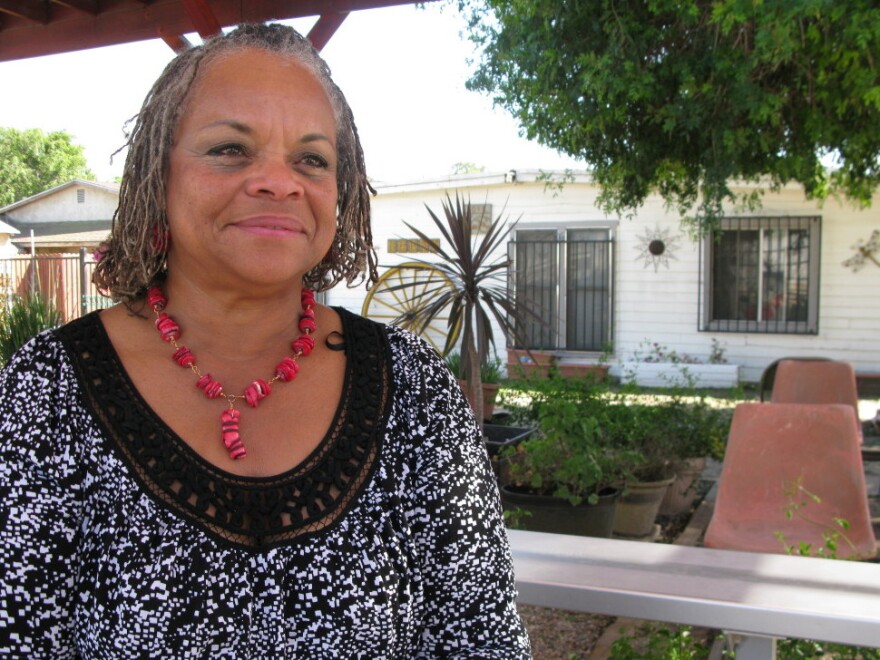Compton, Calif., was named the eighth most dangerous city in America last year. It's the city that put gansta rap on the map and turned Doctor Dre, Ice Cube and Easy-E into household names.
But in one little corner of the city, you're more likely to hear roosters crowing than the bark of a 9 mm. Welcome to the other Compton: Richland Farms.
It's a rural enclave in the middle of Los Angeles where people like Tomas Carlos raise chickens, goats and horses.
"I think I have close to 50 or so chickens," Carlos tells Weekend All Things Consideredhost Guy Raz as they hunt for newly laid eggs in Carlos' backyard.
In exchange for his eggs, Carlos often picks up homemade cheese from neighbors who raise goats, or grabs a cage-free chicken from a friend down the block. Almost every backyard in Richland Farms is home to horses, goats, cows, or chickens. This 10-block enclave in the middle of Compton is the largest urban agricultural zone in the entire Los Angeles basin.
An Agricultural Survivor
In 1888, the man who owned the land, Griffith Compton, donated it to the county, but on one condition. This section of Compton was to be zoned for agricultural use.
"Richland Farms was started at a time in the county when it was very popular to have a home that had a very small acreage around it like a half acre to 3 acres," says Rachel Surls, who studies the history of agricultural planning in L.A. at the University of California Cooperative Extension.
"There were places like this all over the county," Surls says. "What's unique is that this one still exists."

Surls says that in 1950, Los Angeles was the biggest agricultural county in the U.S. Today, it's the most urbanized. Yet somehow, no developer, no city planner, no politician has been able to touch Richland Farms.
Changing Demographics
It may seem odd to an outsider, seeing young men on horseback, wearing cowboy hats, trotting through the streets of Compton. But it's all very normal for Yvonne Arcenaux, the Compton councilwoman. She's lived in this neighborhood most of her life.
"My kids were in 4-H Club, so we started with cows, we had cows, we had donkeys, we had goats," she says. Her family even had a horse for a while, and her husband raised tropical birds.
Seventy years ago, most of the people in Compton were white. Two future presidents lived here for a while. The young family man George H.W. Bush raised his son George W. in Compton for a brief spell in the late 1940s. But around that time, neighborhoods here began to integrate and middle class African-Americans like Arcenaux's family started to move in.
"The complexion of the community has changed a lot. It was predominately African-American when I first moved here," says Arcenaux, "Within maybe the last 10 years, it has changed. We still have a lot of longtime residents that still live here that are African-American, but we have a lot of Hispanics here now."

The change has created some tension between the old-timers and newcomers. Many of the Latino families are originally from rural parts of Mexico, where everyone raised animals on their land. Arcenaux says that in the old days, animal rearing was more of a hobby. Now, it's on a much larger scale, which sometimes causes problems.
Rural Oddballs
Richland Farms resident Mayisha Akbar sits under a canopy as her brother drives by on his tractor. Behind Akbar's home is a working dude ranch. She keeps several horses and runs a youth club called the Compton Jr. Posse.
Akbar says she thinks the tension is more about a generational shift rather than a racial shift.
"People are afraid of change. and as the demographics change in the city of Compton there are a lot of people who are afraid of that," she says.
She describes the people of Richland Farms as tight-knit, rural oddballs in a concrete jungle.
"The soil is our common denominator. And so there wasn't a big stretch to become neighbors or to become a community, because we were a community based on soil and animals," Akbar says. "We know each other's animals, if somebody's animal gets loose, a horse or cow, we know whose it is just like we know their children."
This is Compton. No guns or gangsters. It doesn't fit the story we all know. But if you're ever passing through the city, keep your ears open and you might just hear the roosters.
Copyright 2020 NPR. To see more, visit https://www.npr.org. 9(MDAxNDQ2NDAxMDEyNzU2NzM2ODA3ZGI1ZA001))



